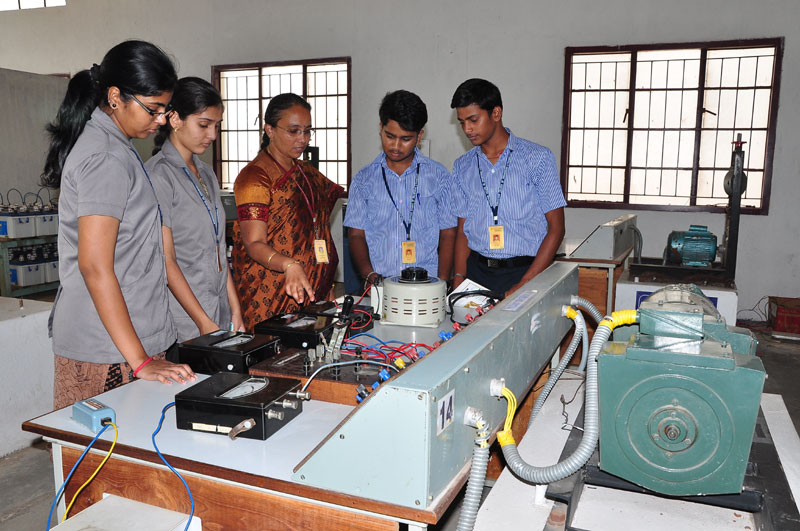M.E. Applied Electronics is a two-year Post-Graduate Engineering course offered by the Department of Electronics and Communication Engineering was started in the year 2009 with present student intake of 18. This programme is operated with the motto of broadening the spectrum of services to the humanity through higher education. Redefining the goals and putting thrust on socially relevant subjects has enabled the programme to produce ready-to-employ graduates and the value-added research outputs with sustained quality and excellence. The curriculum and syllabus for the programs offered in the department are designed as per Regulation 2022 of the autonomous system. The M.E program is aimed at providing a deeper understanding of the mathematical, theoretical, practical and application aspects of Intelligent Systems and Control, Advanced Microprocessors and Microcontroller, Physical Design of VLSI circuits, Robotics and Intelligent Systems and Electronics for Solar Power in par with sustainable development technologies. This program also provides insights into the design aspects of Embedded systems, ASIC and FPGA using optimization techniques.
To become a center of excellence in Electrical and Electronics Engineering education and research, nurturing technologically superior, socially conscious engineers and leaders and nationally responsible citizens.
M1. Providing exemplary learning environment and Imparting quality education in Electrical and Electronics domains to equip students with a broad range of intellectual spectrum and skills.
M2. Providing additional skills and training to meet the current needs of the industry.
M3. Inculcating moral values to meet the challenges of life with courage and confidence.
Engineering Graduates will be able to:
1. Engineering Knowledge - Ability to apply knowledge of mathematics, science, mechanical engineering fundamentals and specialization to the solutions of complex engineering problems;
2. Problem Analysis - Ability to identify, formulate, conduct research literature and analyze complex engineering problems using principles of mathematics, natural sciences and mechanical engineering sciences;
3. Design/Development of Solutions - Ability to design mechanical solutions for complex engineering problems and systems, components or processes that meet specified needs;
4. Investigation - Ability to conduct investigation of complex problems using research based knowledge and research methods to provide valid conclusions;
5. Modern Tool Usage - Ability to develop and apply appropriate techniques, resources, and innovative engineering tools to complex mechanical engineering activities;
6. The Engineer and Society - Ability to apply contextual knowledge to assess societal, health, safety, legal and cultural issues with the awareness of the consequent responsibilities to professional mechanical engineering practice for the betterment of society;
7. Environment and Sustainability - Ability to understand the impact of professional mechanical engineering solutions in societal, economic and environmental contexts and demonstrate knowledge of and need for sustainable development;
8. Ethics - Ability to apply ethical principles and demonstrate commitment to professional ethics, responsibilities and norms of mechanical engineering practice;
9. Communication - Ability to communicate effectively on complex engineering activities with the engineering community and with society at large;
10. Individual and Team Work - Ability to demonstrate knowledge and understanding of mechanical engineering and management principles and apply these effectively as an individual, a member or a leader in diverse teams and in multidisciplinary settings;
11. Life Long Learning - Ability to recognize the need for, and have the preparation and ability to engage in independent and life-long learning in the broadest context of technological change in mechanical engineering practice;
12. Project Management and Finance - Ability to demonstrate knowledge and understanding of project management, finance principles, business development within the scope of mechanical engineering practices.
PROGRAMME OUTCOMES(PO’s) PO1 Engineering knowledge:Apply the knowledge of mathematics, science, engineering fundamentals, and an engineering specialization to the solution of complex engineer
M.E. Applied Electronics is a two-year Post-Graduate Electronics Engineering course. It was started in the year 2009 from the academic year 2009-2010 under the Department of Electrical and Electronics Engineering (EEE) and the student intake is 18. The department is recognized as Research Centre by Anna University, Chennai from the year 2000. The subjects covered in this course provide adequate knowledge of semiconductor devices as well as the p-n junction, rectifiers, bipolar junction transistor, RC coupled amplifier, special devices, feedback amplifier, and oscillator. Subjects usually studied under this degree are neural networks, advanced digital signal processing, VLSI design, applied mathematics for electronics, digital control engineering, analysis and design of analog integrated circuits, computer architecture, parallel processing, ASIC design, design and analysis of algorithms, digital image processing, reliability engineering, robotics, VLSI signal processing, internet multimedia, electromagnetic interference, system design, communication networks, etc.
The curriculum and syllabus for the programs offered in the department are designed as per Regulation 2016 of the autonomous system. The curriculum is designed to achieve a balance between the depth of knowledge acquired through specialization and the breadth of knowledge gained through exploration. The curriculum has been designed to create professional electrical and electronics engineers, who can serve in the fields of core electrical engineering, information and communication systems, and other related fields.

VLSI DESIGN LABORATORY
ELECTRONIC SYSTEM DESIGN LABORATORY
EMBEDDED SYSTEM LABORATORY